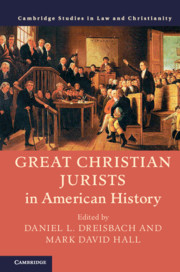Book contents
- Great Christian Jurists in American History
- Law and Christianity
- Great Christian Jurists in American History
- Copyright page
- Dedication
- Contents
- Contributors
- Preface
- Introduction: Christianity and American Law
- 1 John Cotton and Roger Williams
- 2 John Winthrop and the Covenantal Ideal
- 3 Friendly Laws: William Penn’s Christian Jurisprudence
- 4 The Friendly Jurisprudence and Early Feminism of John Dickinson
- 5 Roger Sherman, Oliver Ellsworth, and the Formation of America’s Constitutional Order
- 6 John Jay: The First Chief Justice
- 7 James Wilson
- 8 Was Justice Joseph Story a Christian Constitutionalist?
- 9 Harvard’s Evangelist of Evidence: Simon Greenleaf’s Christian Common Sense
- 10 John Marshall Harlan the Elder
- 11 Judicial Conservatism and Protestant Faith: The Case of Justice David J. Brewer
- 12 John T. Noonan, Jr.: Catholic Jurist and Judge
- 13 The Integrative Christian Jurisprudence of Harold J. Berman
- 14 Antonin Scalia: Devout Christian; Worldly Judge?
- 15 The Insights and Transitions of Mary Ann Glendon
- 16 A Reformed Liberalism: Michael McConnell’s Contributions to Christian Jurisprudence
- 17 The Jurisprudence of Robert P. George
- Index
2 - John Winthrop and the Covenantal Ideal
Published online by Cambridge University Press: 24 June 2019
- Great Christian Jurists in American History
- Law and Christianity
- Great Christian Jurists in American History
- Copyright page
- Dedication
- Contents
- Contributors
- Preface
- Introduction: Christianity and American Law
- 1 John Cotton and Roger Williams
- 2 John Winthrop and the Covenantal Ideal
- 3 Friendly Laws: William Penn’s Christian Jurisprudence
- 4 The Friendly Jurisprudence and Early Feminism of John Dickinson
- 5 Roger Sherman, Oliver Ellsworth, and the Formation of America’s Constitutional Order
- 6 John Jay: The First Chief Justice
- 7 James Wilson
- 8 Was Justice Joseph Story a Christian Constitutionalist?
- 9 Harvard’s Evangelist of Evidence: Simon Greenleaf’s Christian Common Sense
- 10 John Marshall Harlan the Elder
- 11 Judicial Conservatism and Protestant Faith: The Case of Justice David J. Brewer
- 12 John T. Noonan, Jr.: Catholic Jurist and Judge
- 13 The Integrative Christian Jurisprudence of Harold J. Berman
- 14 Antonin Scalia: Devout Christian; Worldly Judge?
- 15 The Insights and Transitions of Mary Ann Glendon
- 16 A Reformed Liberalism: Michael McConnell’s Contributions to Christian Jurisprudence
- 17 The Jurisprudence of Robert P. George
- Index
Summary
John Winthrop, the most important founder of Puritan Massachusetts, organized much of his legal and political thought around the concept of covenant. In constitutional terms, this meant that while all authority comes from God it must be grounded in mutual consent to be legitimate. For Congregationalists like Winthrop, this applied to church as well as state, and the decentralized nature of congregational ecclesiology required active political intervention. In matters of the law, Winthrop combined traditional English institutions and procedures with covenantal ideals. He opposed the codification of Massachusetts’ laws, favoring customary or common laws, because he feared that, without discretion on the part of judges, the punishments handed out would lack equity and violate the covenantal ideal of charity. This charitable and communitarian ethos was exemplified in his irenic statesmanship and relatively lenient treatment of dissent among his fellow covenanting Congregationalists.
Keywords
- Type
- Chapter
- Information
- Great Christian Jurists in American History , pp. 37 - 53Publisher: Cambridge University PressPrint publication year: 2019

